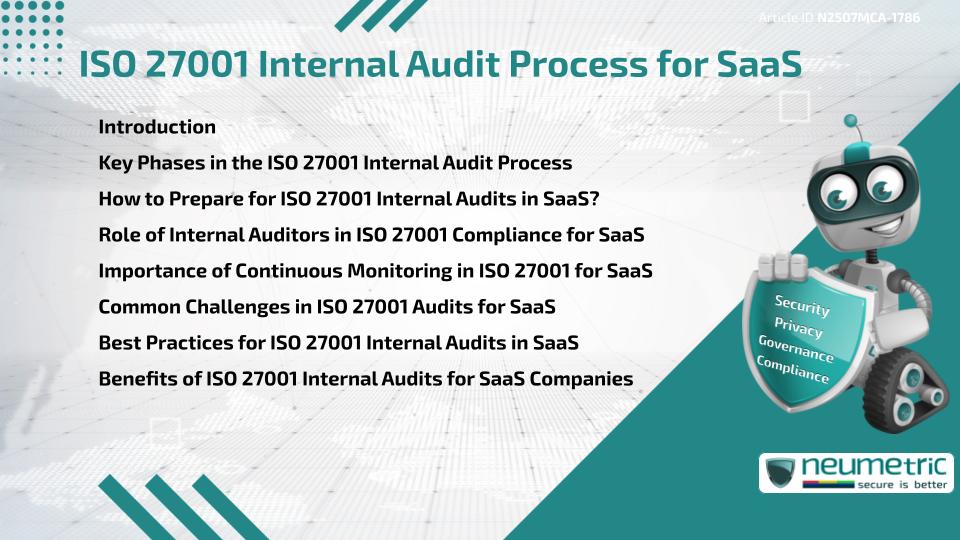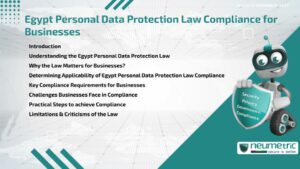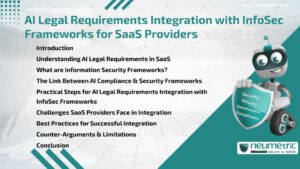Table of Contents
ToggleIntroduction
The ISO 27001 Internal Audit process for SaaS is essential for ensuring that Organisations meet Global Standards for Information Security management. This process focuses on assessing & improving the Security of Sensitive Data, which is crucial for SaaS Providers handling Customer Information. The process involves systematic checks to ensure that the Policies, Controls & Procedures in place align with ISO 27001 Standards.
This article will explore the steps, benefits & Best Practices for executing an effective Internal Audit for SaaS Businesses seeking ISO 27001 Compliance.
Key Phases in the ISO 27001 Internal Audit Process
The ISO 27001 Internal Audit process for SaaS consists of multiple phases, each contributing to the overall Assessment & improvement of Information Security practices. These phases are:
- Planning the Audit: Define the Audit Scope, Objectives & Team. This step involves understanding the key areas of the Information Security Management System [ISMS] and ensuring alignment with ISO 27001 requirements.
- Conducting the Audit: Perform an in-depth review of the SaaS Company’s Information Security Policies, Controls & Practices. This phase involves gathering evidence through Interviews, Document Reviews & System Tests.
- Reporting Findings: Document the Audit Findings, including any Non-Conformities or Weaknesses found in the Organisation’s ISMS. The findings should be communicated clearly to relevant Stakeholders.
- Follow-up & Improvement: Once the Audit Report is complete, the Organisation should take Corrective Actions for any Non-Conformities identified. Monitoring the implementation of these actions is crucial to ensure that they have the desired effect.
How to Prepare for ISO 27001 Internal Audits in SaaS?
Preparation is key to a successful ISO 27001 Internal Audit process for SaaS. Here are several steps to ensure that your Organisation is Audit-ready:
- Review your Policies: Ensure that all Security Policies are up-to-date & align with the ISO 27001 Standard.
- Conduct Pre-Audits: Internal teams should conduct Preliminary Audits to identify potential issues & resolve them before the official ISO 27001 Audit.
- Staff Training: Ensure that all Employees understand their role in maintaining Information Security & complying with ISO 27001.
Role of Internal Auditors in ISO 27001 Compliance for SaaS
Internal Auditors are responsible for assessing whether a SaaS Organisation’s ISMS is functioning as intended. Their primary duties include:
- Evaluating Controls: Ensuring that Security Controls are properly implemented & functioning effectively.
- Assessing Risks: Identifying Risks & Weaknesses in the ISMS that could expose the Organisation to Threats or Vulnerabilities.
- Providing Recommendations: Suggesting Corrective Actions to improve Security & meet ISO 27001 requirements.
Auditors play a vital role in helping SaaS businesses stay compliant & ensure continuous improvements in their Information Security practices.
Importance of Continuous Monitoring in ISO 27001 for SaaS
Continuous Monitoring is crucial in the ISO 27001 Internal Audit process for SaaS. This ongoing evaluation helps Organisations stay ahead of emerging Risks & ensure that their Information Security systems remain effective. Monitoring should include:
- Real-Time Threat Detection: Using Automated Tools to monitor Security Events & Incidents.
- Regular Reviews: Conducting regular Security Reviews to assess whether the Security Measures are still effective & compliant with ISO 27001 Standards.
This proactive approach is vital for ensuring that the ISMS remains robust & adaptable to changing security landscapes.
Common Challenges in ISO 27001 Audits for SaaS
There are several challenges that SaaS businesses may face during the ISO 27001 Internal Audit process. These include:
- Complexity of the ISMS: SaaS Companies often operate in Dynamic environments, which can make it difficult to maintain a consistent & comprehensive ISMS.
- Resource Constraints: Smaller Organisations may struggle to allocate sufficient Resources, both in terms of Personnel & Technology, to support a Full-scale Audit.
- Resistance to Change: Employees may resist the Audit process, especially when changes to current practices are needed.
By acknowledging & preparing for these challenges, SaaS Businesses can streamline their Audit process & make it more effective.
Best Practices for ISO 27001 Internal Audits in SaaS
Adopting Best Practices can help ensure a successful & efficient ISO 27001 Internal Audit process for SaaS. Some of these Best Practices include:
- Involve Leadership: Top Management should actively support the Audit process & prioritise Compliance.
- Use Technology: Leverage Auditing Tools & Software to automate processes & reduce manual effort.
- Clear Communication: Foster transparent communication with Employees & Stakeholders about the Audit process, ensuring that everyone understands their responsibilities.
These practices not only help in conducting effective Audits but also in maintaining continuous Compliance with ISO 27001.
Benefits of ISO 27001 Internal Audits for SaaS Companies
ISO 27001 Internal Audits offer several benefits to SaaS Companies, including:
- Improved Security Posture: Regular Audits help identify Weaknesses & address them before they become major Vulnerabilities.
- Regulatory Compliance: Audits ensure that the Company adheres to relevant Industry Standards & Regulations, avoiding Fines & Penalties.
- Enhanced Trust: Demonstrating ISO 27001 Compliance can improve Trust with Clients & Stakeholders, making it a competitive advantage.
Overall, ISO 27001 Internal Audits help Organisations stay secure, compliant & competitive in an increasingly regulated digital landscape.
Takeaways
- The ISO 27001 Internal Audit process for SaaS is essential for ensuring Compliance with Information Security Standards.
- Proper Planning, Preparation & Continuous Monitoring are critical for a successful Audit.
- Internal Auditors play a crucial role in assessing & improving a SaaS Organisation’s ISMS.
- Overcoming challenges like Resource constraints & resistance to change is vital for Audit success.
- ISO 27001 Audits bring significant benefits, including improved Security, Regulatory Compliance & enhanced Trust.
FAQ
What is the ISO 27001 Internal Audit process for SaaS?
The ISO 27001 Internal Audit process for SaaS is a structured approach used to evaluate the effectiveness of a Company’s Information Security management system [ISMS] and ensure Compliance with ISO 27001 standards.
How often should ISO 27001 Internal Audits be conducted for SaaS Businesses?
ISO 27001 Internal Audits should typically be conducted annually, though more frequent audits may be necessary depending on the size of the Organisation & the complexity of its ISMS.
What are the key steps involved in the ISO 27001 Internal Audit process for SaaS?
The process includes planning the Audit, conducting the Audit, reporting Findings & following up to ensure Corrective Actions are taken.
Why is Continuous Monitoring important in the ISO 27001 Internal Audit process for SaaS?
Continuous Monitoring helps Organisations identify emerging Security Risks & ensure that their ISMS remains effective & aligned with ISO 27001 Standards.
What challenges do SaaS Companies face during ISO 27001 Internal Audits?
SaaS Companies may face challenges such as complex ISMS structures, Resource constraints & Resistance to changes during the Audit process.
How can SaaS Companies prepare for an ISO 27001 Internal Audit?
Preparation includes reviewing Policies, conducting Pre-audits & Training Staff on Information Security practices.
What are the benefits of ISO 27001 Internal Audits for SaaS Companies?
Benefits include improved Security, Regulatory Compliance, enhanced Trust from Clients & a competitive edge in the Market.
Need help?
Neumetric provides organisations the necessary help to achieve their Cybersecurity, Compliance, Governance, Privacy, Certifications & Pentesting goals.
Organisations & Businesses, specifically those which provide SaaS & AI Solutions, usually need a Cybersecurity Partner for meeting & maintaining the ongoing Security & Privacy needs & requirements of their Clients & Customers.
SOC 2, ISO 27001, ISO 42001, NIST, HIPAA, HECVAT, EU GDPR are some of the Frameworks that are served by Fusion – a centralised, automated, AI-enabled SaaS Solution created & managed by Neumetric.
Reach out to us!





